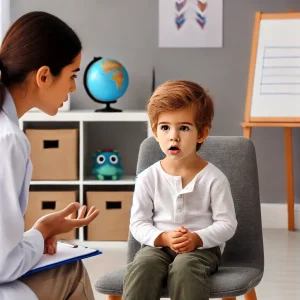How Speech Pathology Can Improve Communication
Last Updated: August 30, 2024
Have you ever found yourself struggling to express your thoughts clearly or understand someone else’s words? Communication is the cornerstone of our daily interactions, influencing everything from personal relationships to professional success. Yet, for many people, effective communication doesn’t come easily. This is where speech pathology steps in.
Speech pathology, also known as speech therapy or speech-language pathology, is a field dedicated to diagnosing and treating communication and swallowing disorders. Imagine being able to express yourself more clearly, engage in conversations with confidence, and understand others better. Speech pathology can make this possible, significantly enhancing your quality of life.
What is Speech Pathology?
Speech pathology, also known as speech-language pathology, is a specialized field focused on diagnosing and treating communication and swallowing disorders. This area of healthcare is crucial for helping individuals of all ages improve their ability to express themselves and understand others.
What Do Speech Therapists Do?
Speech-language pathologists (SLPs), are trained professionals who work with people facing various communication challenges. Their roles are diverse and tailored to each patient’s unique needs. Here are some of the key issues they address:
- Speech Disorders: These include problems with articulation (making sounds), fluency (such as stuttering), and voice disorders (issues with pitch, volume, or quality).
- Language Disorders: These can involve difficulties with understanding others (receptive language) or sharing thoughts, ideas, and feelings (expressive language). This might manifest as problems with vocabulary, grammar, or forming sentences.
- Social Communication Disorders: These issues affect the ability to use verbal and nonverbal communication appropriately in social contexts. It includes challenges with greeting others, taking turns in conversation, and using body language and facial expressions.
- Cognitive-Communication Disorders: These are related to problems with thinking skills, such as memory, attention, perception, and problem-solving. They can result from conditions like stroke, traumatic brain injury, or dementia.
- Swallowing Disorders (Dysphagia): Speech therapists also help individuals who have trouble swallowing due to medical conditions or treatments that affect the muscles and nerves involved in the swallowing process.
The Impact of Speech Pathology
Speech pathology is not just about addressing speech and language issues; it’s about enhancing overall communication skills, which can lead to better personal relationships, academic success, and professional opportunities. By working with a speech therapist, individuals can significantly improve their quality of life and self-confidence.
How Speech Pathology Improves Communication
Speech pathology plays a vital role in enhancing communication skills across different age groups. Whether you are a parent concerned about your child’s speech development, an adult recovering from a stroke, or an elderly person dealing with age-related communication issues, speech therapy can offer significant benefits.
Children: Overcoming Speech Impediments and Improving Fluency
Children often face challenges such as stuttering, difficulty articulating words, or trouble understanding language. These issues can affect their confidence and social interactions. Speech pathologists use various techniques to help children overcome these impediments:
- Articulation Therapy: This helps children learn how to produce sounds correctly, which improves their pronunciation and clarity.
- Language Intervention: Enhances vocabulary, sentence structure, and comprehension skills, enabling children to express themselves more effectively.
- Fluency Therapy: Addresses issues like stuttering, helping children speak more smoothly and confidently.
Adults: Relearning Communication Skills Post-Stroke or Injury
For adults who have experienced a stroke or traumatic brain injury, regaining lost communication skills is crucial. Speech therapy can make a significant difference in their recovery process:
- Cognitive-Communication Therapy: Helps improve memory, attention, and problem-solving skills that are often affected by brain injuries.
- Speech and Language Exercises: Focus on relearning how to articulate words, form sentences, and understand language.
- Swallowing Therapy: Assists individuals who have difficulty swallowing, ensuring they can eat and drink safely.
Also read: What is the Relation between Communication, Speech and Language? | Speech and Language Therapy
Elderly: Managing Age-Related Communication Issues
As people age, they may experience communication challenges due to conditions like dementia, Parkinson’s disease, or simply the natural aging process. Speech pathology can help manage these issues:
- Voice Therapy: Addresses changes in pitch, volume, and quality of voice, which can be common in older adults.
- Language and Cognitive Therapy: Helps improve language comprehension and usage, as well as cognitive functions like memory and attention.
- Swallowing Therapy: Supports individuals who have difficulty swallowing, which can prevent complications like aspiration pneumonia.
Age-Specific Benefits of Speech Pathology
| Age Group | Benefits |
|---|---|
| Children | – Overcoming Speech Impediments: Helps children correct articulation issues and improve pronunciation. – Improving Fluency: Addresses stuttering and other fluency disorders, enabling smoother speech. – Language Development: Enhances vocabulary, grammar, and sentence structure, aiding in better communication and academic performance. – Social Skills: Teaches appropriate social cues and interaction skills, improving peer relationships. |
| Adults | – Relearning Communication Skills Post-Stroke or Injury: Assists in regaining lost speech and language abilities after neurological damage. – Cognitive-Communication Therapy: Improves memory, attention, and problem-solving skills affected by brain injuries. – Swallowing Therapy: Helps adults with dysphagia regain safe swallowing functions. – Voice Therapy: Addresses changes in voice pitch, volume, and quality due to medical conditions or surgery. |
| Elderly | – Managing Age-Related Communication Issues: Provides strategies to cope with dementia, Parkinson’s disease, and other age-related conditions affecting communication. – Enhancing Vocal Quality: Improves voice clarity and strength, countering the effects of aging on vocal cords. – Swallowing Therapy: Aids in managing swallowing difficulties common in older adults, preventing complications like aspiration. – Maintaining Cognitive Functions: Supports memory, attention, and other cognitive skills to enhance overall communication. |
Key Techniques Used in Speech Pathology
Speech pathologists employ a variety of techniques to help individuals improve their communication skills. These methods are tailored to address specific speech and language challenges, making a significant impact on a person’s ability to communicate effectively.
1. Articulation Therapy: Improving Sound Production
Articulation therapy focuses on helping individuals produce sounds correctly. This is particularly beneficial for children who struggle with pronouncing certain sounds. Speech therapists work with patients to practice and refine their ability to form sounds, which enhances their overall speech clarity. For example, a child who has difficulty pronouncing the “r” sound will learn techniques to produce it correctly.
2. Language Intervention: Enhancing Vocabulary and Sentence Structure
Language intervention is aimed at improving a person’s understanding and use of language. This technique helps expand vocabulary, improve grammar, and enhance sentence structure. Through various activities and exercises, individuals learn to express their thoughts more clearly and understand others better. This is especially useful for children with developmental delays or adults recovering from a stroke.
3. Voice Therapy: Addressing Voice Disorders
Voice therapy is designed to help individuals with voice disorders, such as problems with pitch, volume, or quality of voice. Speech therapists teach techniques to improve vocal function and reduce strain on the vocal cords. This therapy is beneficial for people who experience hoarseness, voice fatigue, or other vocal issues.
4. Fluency Therapy: Managing Stuttering
Fluency therapy focuses on helping individuals manage stuttering and speak more smoothly. Techniques include teaching controlled breathing, slow speech patterns, and relaxation methods. This therapy helps individuals gain confidence in their speaking abilities and reduces the frequency and severity of stuttering episodes.
Augmentative and Alternative Communication (AAC): Using Devices for Communication
Augmentative and Alternative Communication involves the use of devices or other methods to assist those who cannot communicate verbally. This can include picture boards, speech-generating devices, or apps on tablets and smartphones. AAC provides an alternative means of communication, enabling individuals to express their needs and interact with others effectively.
Conclusion
Speech pathology is essential for improving communication skills at any age. It helps children overcome speech impediments, aids adults in relearning how to communicate after a stroke, and assists the elderly in managing age-related communication issues. The benefits of speech therapy are extensive and can significantly improve one’s quality of life.
If you or your loved ones face communication challenges, don’t hesitate to seek help from a qualified speech pathologist. Effective communication opens doors to better relationships, academic success, and professional growth. At Wellness Hub, our team of experienced speech pathologists is ready to support you. Explore our services to find the help you need. Start your journey to clearer and more confident communication today.
Frequently Asked Questions:
1. How does speech pathology improve communication?
Speech pathology improves communication by addressing issues with sound production, language comprehension, social cues, and cognitive communication. Techniques like articulation therapy, language intervention, and fluency therapy help individuals speak more clearly and confidently.
2. What are the benefits of speech pathology?
The benefits of speech pathology include improved communication skills, better social interactions, enhanced academic and professional performance, and increased self-confidence. It helps individuals express themselves clearly and understand others better.
3. Can speech pathology help with stuttering?
Yes, speech pathology can help manage stuttering through fluency therapy. This involves techniques like controlled breathing, slow speech patterns, and relaxation methods to reduce the frequency and severity of stuttering episodes.
4. What is articulation therapy in speech pathology?
Articulation therapy focuses on helping individuals produce sounds correctly, improving their pronunciation and clarity. This technique is particularly beneficial for children who struggle with certain speech sounds.
5. How can I find a qualified speech pathologist?
To find a qualified speech pathologist, check their credentials and certification, ask for referrals from healthcare providers, read reviews, and schedule a consultation to ensure you feel comfortable with their approach. At Wellness Hub, we offer experienced and certified speech therapists to help you.
6. What age groups can benefit from speech pathology?
Speech pathology can benefit individuals of all ages, including children, adults, and the elderly. It helps children with speech development, adults recovering from injuries, and the elderly managing age-related communication issues.
7. What techniques are used in speech therapy for communication disorders?
Techniques used in speech therapy include articulation therapy, language intervention, voice therapy, fluency therapy, and augmentative and alternative communication (AAC). These methods address various communication challenges to improve overall speech and language skills.
8. How effective is speech therapy for children?
Speech therapy is highly effective for children, helping them overcome speech impediments, improve fluency, and develop better language skills. Early intervention can lead to significant improvements in academic performance and social interactions.
9. What is augmentative and alternative communication (AAC)?
AAC involves using devices or other methods to assist those who cannot communicate verbally. This can include picture boards, speech-generating devices, or apps on tablets and smartphones, providing an alternative means of communication.
10. Where can I get speech therapy services?
You can get speech therapy services at specialized clinics, hospitals, schools, and private practices. At Wellness Hub, we offer comprehensive speech therapy services tailored to individual needs, provided by experienced and certified speech pathologists.
About the Author:
Anuradha Karanam
Speech-language pathologist (7+ years of experience)
Anuradha Karanam is a skilled speech-language pathologist with over 6 years of experience. Fluent in Tamil, Telugu, Hindi, and English, she specializes in parent counseling, speech sound disorders, fluency assessment, and speech-language evaluations. Anuradha excels at working with children with developmental disorders, offering creative and effective therapy programs. Currently, at Wellness Hub, she holds a BASLP degree and is registered with the RCI (CRR No A85500). Her patience, ambition, and dedication make her a trusted expert.
Book your Free Consultation Today
Parent/Caregiver Info:
Client’s Details:
* Error Message









